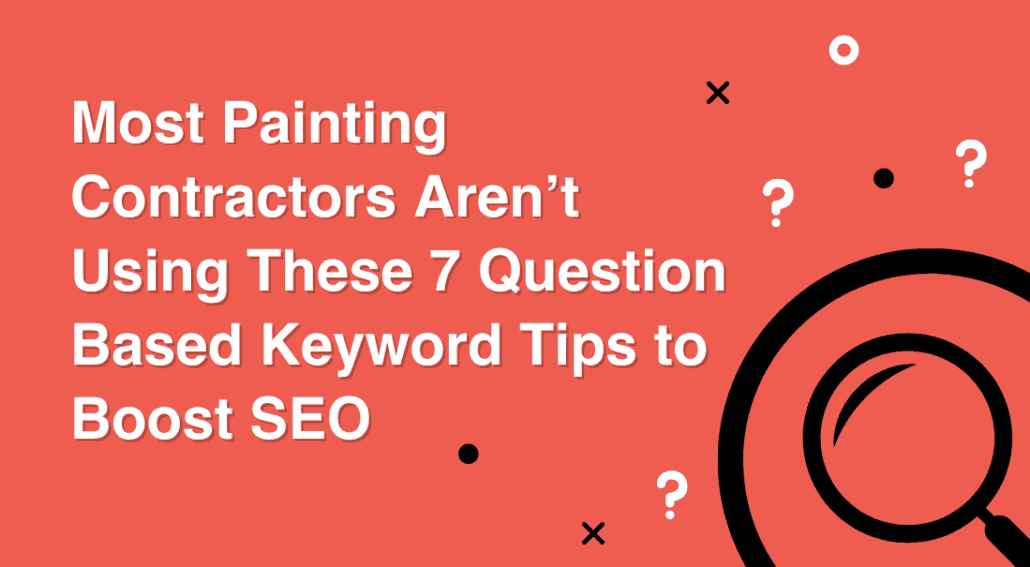
Most Painting Contractors Aren’t Using These 7 Question Based Keyword Tips to Boost SEO
58% of people use voice search to find local businesses or ask questions about them.
By asking questions, they’re finding information about painting services they need.
The best way to make sure they’re landing on your painting website is by using question-based keywords.
Here are 7 question based keyword tips you can use to boost SEO:
1. Make Use Of Google’s Keyword Planner To Find Question-Based Keywords
The first way that you’re going to be able to find some good question based keywords is to use Google’s Keyword planner.
The thing you need to know about the keyword planner is that it’s just going to find you simple keywords.
Here, for example, we used the words “kitchen cabinet painting” to find more keywords.
You’ll notice that there are quite a few keywords there (and there are many more on the planner) but it’s up to you to phrase it as a question.
Question keywords here might be “What is a good kitchen paint?” or even “What kind of cupboard paint should I use?”
[Related: Painting Contractors: How to Grow SEO Traffic Using UberSuggest]2. Use QuestionDB To Find More Questions
Another excellent way to find some good questions based keywords is to use the excellent site QuestionsDB.
QuestionsDB works by asking you to input a couple of words and then it will find questions based on those words.
In some ways this is a bit easier to use than the Google keyword planner because it makes the questions for you.
It ideally wants you to input only a couple of words to generate keywords.
This was made clear when I searched for kitchen cabinet painting and it came up with… nothing.
By using only two keywords, a good number of questions were found:
In addition to finding good question keywords, you’ll be able to find good topics for future blogs using QuestionDB.
3. Look At The Keywords Your Competitors Are Using
A great way for you to get good question keywords for your site is to have a good look at what your competitors use for their site.
You may not know exactly who your competitors are but it should be fairly easy to see who else does the same kind of painting you do.
Once you have found their sites, it’s a matter of using the right tools to analyze the keywords that they use.
Here’s a tutorial on finding out what keywords their websites use so that you can see if there might be any you could also use:
<center><iframe width=”560″ height=”315″ src=”https://www.youtube.com/embed/ARGWHKekggo” title=”YouTube video player” frameborder=”0″ allow=”accelerometer; autoplay; clipboard-write; encrypted-media; gyroscope; picture-in-picture” allowfullscreen></iframe></center>
4. Understand Semantics To Better Answer Questions
In order to add really good question based keywords to your site it’s important to understand how Google makes use of semantics in search.
In the early years of Google, it would just search for words and phrases on sites and show results based on that.
In recent years, they’ve added the idea of semantics — the idea being that people search for things for a reason.
If you know why people are searching for questions, you’ll be able to better answer those questions.
It’ll be a lot better for you if you understand how semantics work with Google for these reasons.
5. Look At Your Pages To See How Quickly They Answer Questions
People are often looking to your site to get answers to their questions about painting and the painting process.
When they’re looking for these answers, how soon is it that they actually get an answer?
As busy as people are, they don’t have time to scroll for several paragraphs before they see an actual answer.
Ideally you’re going to want to at least address the question being asked in the first paragraph or two.
It’s worth going through your site and seeing where questions are answered and fixing them where needed.
6. Make Sure You Have An FAQ Section
Simply put, you are going to need to make sure that you have an FAQ section on your site — that’s Frequently Asked Questions.
The purpose of an FAQ page on your site or blog is to address questions that people often will have about what you do.
A good thing about an FAQ page is that you can use it to link to pages or blog articles.
The way you’d do this is in answering a question, you can write “for more information click here” and link to a relevant article.
7. Consider “People Are Also Asking”
Lastly, some of the best questions that you may not be answering already could be sitting in plain sight on Google.
Whenever you search on Google, it will show you questions that people are asking on Google that are related to your search.
To keep the kitchen cabinet painting theme going, here are the questions related to it:
Just by asking simple questions on Google or using terms from your site, you can find quite a few more questions.
Quick Recap:
1. You can find some question based keywords making use of Google Keyword planner
2. There are more keywords that you can find if you use QuestionDB
3. You can look at the keywords your competitors are using to get some ideas for your own site and blog
4. To better answer questions people are asking, it’s good to understand semantics and how search engines use them – the setting of the question and why people are asking it.
5. It’s good to look at your pages and make sure you quickly are answering questions — ideally in the first paragraph or so.
6. If you don’t have an FAQ (Frequently Asked Question) section on your site, make sure that you add one
7. Look at the “People Are Also Asking” section on Google to see what questions you may need to answer on your site and blog